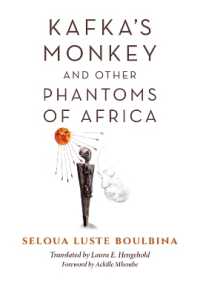- ホーム
- > 洋書
- > 英文書
- > Biography / Autobiography
Full Description
From 1900 to 1924 Spain experienced a stage of vigorous academic freedom and unfettered scientific inquiry that strikingly contrasted with the repressive atmosphere of the periods before and after. Thomas Glick explores this "recovery of science" by focusing on the national discussion provoked by Einstein's trip to Spain in 1923. His visit stimulated a debate on the nature and social value of science that was remarkable in a society so recently awakened to the scientific role in the process of modernization. Einstein's universal appeal created the unlikely occasion for a fascination with science that cut across social classes and previously established domains of discourse. The political Right, which in other countries opposed relativity in the name of "traditional" Newtonian science, backed the new theories with surprising enthusiasm. Engineers, a politically conservative group, contributed much of the rank-and-file support for Einstein; physicians, who tended to the Left, also eagerly embraced his ideas, as did a host of mutually antagonistic political groups, including anarcho-syndicalists and bourgeois Catalan nationalists.
Professor Glick's analysis of this multidimensional scientific forum provides an unusual amount of information on science in Spain and an opportunity to contrast the Spaniards' reception of Einstein's work and that of other nations during this historical period. Originally published in 1988. The Princeton Legacy Library uses the latest print-on-demand technology to again make available previously out-of-print books from the distinguished backlist of Princeton University Press. These editions preserve the original texts of these important books while presenting them in durable paperback and hardcover editions. The goal of the Princeton Legacy Library is to vastly increase access to the rich scholarly heritage found in the thousands of books published by Princeton University Press since its founding in 1905.
Contents
*FrontMatter, pg. i*Contents, pg. vii*List of Illustrations and Tables, pg. viii*Preface, pg. xi*Introduction, pg. 1*Chapter One. Spanish Science and the Reception of Relativity, pg. 17*Chapter Two. The Einstein Phenomenon, pg. 74*Chapter Three. Barcelona: Einstein and Catalan Nationalism, pg. 100*Chapter Four. Madrid: The Two Aristocracies, pg. 123*Chapter Five. The Debate over Relativity in the 1920s, pg. 150*Chapter Six. Relativity and Spanish Engineers: The Scientific Middle Class, pg. 188*Chapter Seven. The Slave at the Sermon: Einstein and the Spanish Intelligentsia, pg. 238*Chapter Eight. Flow and Transformation of Ideas, pg. 276*Chapter Nine. After Einstein's Visit, pg. 302*Appendixes, pg. 323*Bibliography, pg. 357*Index, pg. 377








